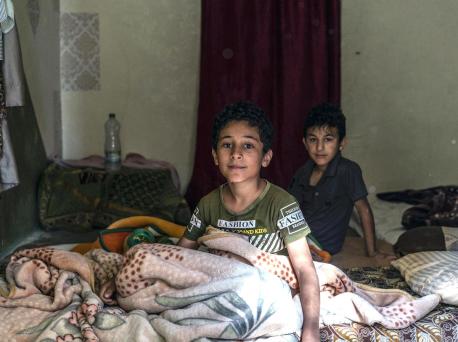
Keeping Children in Jordan Warm, Fed and Learning This Winter
In the midst of the devastating COVID-19 pandemic, vulnerable families across Jordan are bracing themselves for another harsh winter. With livelihoods decimated and resources severely limited, families living in poverty will have very little to protect themselves from the frequent snowfall and sub-zero temperatures in the months ahead.
To meet the needs of more than 64,000 at-risk children in Jordan, including Syrian refugees, UNICEF has launched a $6 million Winter Children's Appeal. The funds will be used to provide warm winter clothing and emergency cash assistance to keep children warm, fed and in school.

In 2012, Mariam and Modhi fled Raqqa, Syria with their sons, 2-year-old Ahmad and 1-year-old Abdullah, and crossed the border into Jordan. Today, the family lives in a sparsely furnished house in Amman, Jordan's capital city. Ahmad, 10, and Abdullah, 9, have a little brother, 7-year-old Ali, and a little sister, Hanin, 4.
“Winter is really, really bad here,” says Mariam. “I worry about how to keep my children warm. The biggest issue is this house – we have no heating and the roof is always leaking … The children are sick with colds all the time. We scavenge for wood to burn and when there’s none, we spend days cuddling under blankets.”

COVID-19 containment measures in Jordan have exacerbated an already difficult situation for families struggling to survive. A recent survey found that the number of households existing on an income of less than 100 dinars ($140) a month has doubled since the start of the pandemic.

The economic strain has driven families to resort to harmful coping mechanisms, including child labor and increasing levels of debt. To support his family, Ahmad works alongside his father, Modhi, collecting soda cans and other scrap metal to sell. “It makes me feel so ashamed to work collecting scraps,” says Ahmad (above, right). “I feel like everyone is looking at me and laughing at me. No matter how much I do it, it never feels normal.”

UNICEF’s Hajati cash assistance program is designed to help prevent children from dropping out of school and families from falling further into poverty. The program, which has helped 30,000 children continue their learning during the COVID-19 health crisis, is accessible to all children, regardless of nationality or status. Each eligible child receives 25 dinars ($35) per month during the school term. “Without Hajati, the children would not be able to go to school,” says Mariam. “The thing that frightens me the most is my children not getting an education.” Above, Hanin (left) and Ali stand outside their house in Amman.

The cash assistance program will target 34,500 children with an emergency winter cash payment to support them and their families during the coldest months, easing the financial burden of increased heating and clothing costs. Before the pandemic, Mariam and Modhi used the cash assistance to pay for their children’s school expenses, but when COVID-19 containment measures shut down the city, the monthly payment became the family's lifeline.
“During lockdown, Hajati was the only way we could buy food. We bought bread, rice and oil,” says Modhi. “If we received an extra winter payment, I would buy a heater first. That’s the most important thing. Then a gas container, warm clothes for the children, and rice and lentils to eat.” Above, Ahmad sits with his sister Hanin inside their house in Amman.

To support economic recovery efforts and provide income-generating opportunities for those who have been hit hardest by the secondary impacts of the pandemic, 30,000 of UNICEF’s children’s winter clothing kits will be produced in Jordan by youth and women employed by social enterprises. By leveraging its network of community-based Makani centers, UNICEF will distribute the kits — which contain a set of thermal underwear, sweater, trousers, jacket, hat, gloves, scarves, socks and winter shoes — to the children who are most in need. Above, from left: Ahmad, Abdullah, Ali and Hanin near the graveyard where they search for firewood in the winter. “We don’t have a heater,” explains 7-year old Ali. “We gather firewood from the graveyard and put it in a pot and light it on fire in the room. Then we get under all of the blankets.”
For families like Mariam, Modhi and their children, the coldest months can lead to a doubling of their budget to cover the costs of heating, winter clothes, food and medicine. UNICEF’s winter appeal will help to meet those needs and protect Jordan’s most vulnerable children. “There are so many families like us,” says Mariam. “We need more support so we can provide for our children.”
Top photo: Brothers Ahmad (left), 10, and Abdullah, 9, and their family, refugees from Syria, are facing another frigid winter in Jordan. UNICEF emergency cash assistance and winter clothing kits will help them survive. All photos © Moises Saman for UNICEF
HOW TO HELP
There are many ways to make a difference
War, famine, poverty, natural disasters — threats to the world's children keep coming. But UNICEF won't stop working to keep children healthy and safe.
UNICEF works in over 190 countries and territories — more places than any other children's organization. UNICEF has the world's largest humanitarian warehouse and, when disaster strikes, can get supplies almost anywhere within 72 hours. Constantly innovating, always advocating for a better world for children, UNICEF works to ensure that every child can grow up healthy, educated, protected and respected.
Would you like to help give all children the opportunity to reach their full potential? There are many ways to get involved.



